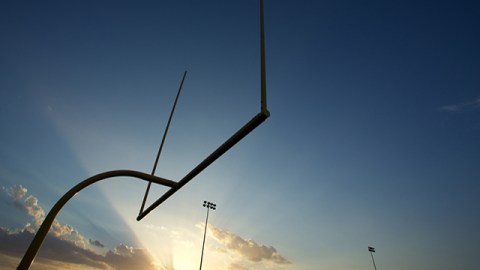Where Religion and Sports Collide (And Sports Win)

I’m pretty certain that the New York Mets won the ’86 World Series because I refused to put my feet on the ground. Perched on the edge of my bed, I’d keep my legs tucked in during pivotal moments—Mookie Wilson’s epic ground ball through Bill Buckner’s legs being one of them. If I would have let my feet falter, who knows what disaster my team would have encountered?
I feel (somewhat) comfortable sharing this completely insane memoir of an eleven-year-old baseball fanatic because, as it turns out, most every sports fan has a ritual or ten they abide by. The tribal tendency towards sympathetic magic has evolved from annually slaying Mexican corn goddesses to scribing war paint on our faces during college football games. So it’s totally possible that the Ravens won on Sunday due to my good friend wearing a purple bra to the Super Bowl party she attended.
Our tribal roots and religious proclivities are at an interesting juncture. As Michael Serazio reported in the Atlantic, religiously unaffiliated Americans are at an all-time high of 20%, with a full one-third of those under thirty admitting such. The largest church in the country, Lakewood, has a capacity of 16,800; the University of Alabama’s football stadium, 101,821. As a nation we understand our weekend priorities.
These are obviously two very different activities. Yet they share inclinations: community, epic battles, ritual dress, the concept of destiny, and the aforementioned ability to influence events you’re not directly involved in through prayer, oblation and superstition. What follows is why sporting events are a more peaceful and creative match for our world over religious gatherings.
Community
While I do not regularly attend religious services, their most appealing aspect has always been community. I believe that’s why a lot of people attend, more so than the need for a divinity. Humans like congregating. Anything that offers us that possibility is a great thing.
That said, sporting events are way more interactive. Sure, you get to sing the occasional hymn in church, but where else can you scream your head off without being put in handcuffs? I’ve seen very few high-fives given during the reading of Deuteronomy. The whole someone died for your sins thing is simply outdated. Accessing communal guilt pales in comparison to accessing communal adrenalin. Plus, alcohol isn’t taboo—it’s part of the ritual.
Epic Battle
I love epic war tales. But recounting the same one over and over on a weekly basis has got to get boring. Not so watching the Brooklyn Nets trounce the Knicks to inch closer to first place. While the occasional scuffle occurs on the court, you don’t get into that whole thing about certain people being righteous while others are heading to eternal damnation. Sure, Ray Lewis crosses that boundary, but the nutty outlier is the price you have to pay. No divine agency is moving players around on that field or court—good old human talent and passion inspires us. Bonus: battle scars in the arena heal quickly. Grudges don’t last in true sportsmen. In some religious organizations, they’ve continued for millennia.
Ritual Dress
Way more interesting in a football arena. Business casual is simply not comfortable adornment. Splotching green and yellow lightning bolts across your face is much more tribal and true to our nature than knotting another Half-Windsor. Growing up with season tickets to Veterans Stadium, I’m still not sure exactly what the Phanatic was supposed to be, but he/she/it was a lot more fun than watching a dour man in a black djellaba-type garment on center stage. (Yes, I know certain churches are trying to be ‘hip’ to reach younger audiences by ‘dressing down.’ Still not as fun.)
Destiny
The concept of destiny is popular in religious writings. Note that all such texts were written after the events had occurred. Hindsight provides an easy excuse for destiny. Not the case in sports. It might seem like a certain team is poised to win, but therein lies the genius of sport: you just never know. I was in Boulder for the Broncos/Ravens game, and there was no reason that Baltimore should have taken that game. Destiny? A few weeks later we can claim such. But that gives no actual proof. Sports allow us to shed the ridiculous concept of destiny and be content with living in the moment uncertain as to what happens next—a great primer for the spiritual life as well.
Sympathetic Magic
As much as I’d like to fancy myself for having helped the ’86 Mets attain their championship ring, I know better. Sporting events provide the perfect example for the absurdity of this belief that we can influence events thousands of miles away. While I was rooting for the 49ers in a Culver City bar, I’m guessing others were actually praying. Did god not hear them? Or is he just a Baltimore fan? Divine agencies are only invoked by the winners; you rarely hear from the other side. With that kind of PR, it’d be hard not to have faith! Not that I have anything against faith: I am, admittedly, a lifelong Jets fan. Therein, perhaps, is where my atheism began.
Image: /shutterstock.com





